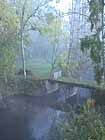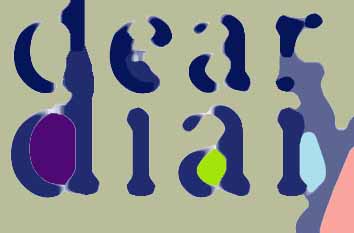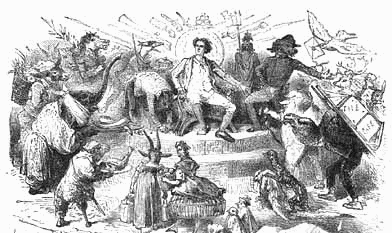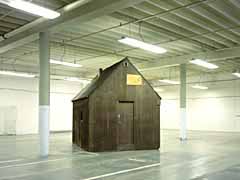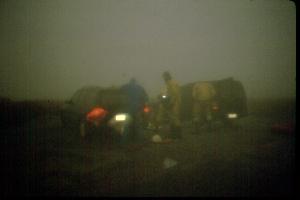Hi, if you've come for Ray, you'll find him most probably in his parlour.
I just want to see things coming: out of nowhere. First in, first served.
out of nowhere
Yesterday's late night illumination, 'out of nowhere', echoes in today's entry and in my early morning concentration. From out of nowhere (really) my mood swung and focused on frustration. (Maybe it is something I read). 'Arrested development' is one of the sadder phenomenons in life to witness. 'Lack of competition' is another. Like lack of opposition. Lack of friction. 'People talking not listening' another. 'All things loud but shallow' another. I could go on. All would file under incompetence, or lack of confidence. Sad, because talents are wasted here and everywhere, due to a systematic and dominant lack of esteem, discreteness, modesty, respect ...undermining confidence, in spectacular industries that only exist to pump up whatever volume, not to enhance individual development and (as a cornerstone to) collaborative intelligence, not to support with all means the exploitation of talents, or excellence, or art. But who's smart, never blames the context.
When Stewart reminds his addressee (us), in a letter on 'what matters, professionaly' ('Knowing What I Want'), published on sylloge, like letters are fortunately published today, so to serve to build a wider audience, support it intellectually, make it smarter, make it recognize its talent better:
- ...Part of what I'm looking for is a place where there are people who are better/smarter/more experienced than me, where I can learn and where there is some kind of tradition and theoretical framework for doing design. (For just the same reasons why it is more fun to play music with people who are better than you.)I think: I know this argument. It's good, I've used it to improve my play. Only the confidently smart search the smarter. 'Stand on the shoulders of others. You have a better view up there' (Bruce Mau). To play with (or to compete with) the better will improve your skill, always. Then, once you're comfortably up there, the 360° view reveals infinite directions, myriad bright spots in the landscape. And the smart shouldn't complain the choice, never blame the context, remember?. That's the only downside of smartness: no complaint. The smarts' only commitment is to 'know what they want'. Is this being hard on the smart? I don't think so. Of all the things hard on smart, the smart is always hardest on him or herself: there's a smart definition, if ever you need one. It causes confusion, and lack of direction, precisely if talents support different directions to choose from: if one has 'all the options' to visit all the brightest spots and see who hang out there, who make it shine so clear.
So what's the original direction of talent? Into the light? Into trouble, I'd say. Into complication. Ignotum per ignotius, looking for clues, 'out of nowhere'. Since: clues out of talent itself, is too un-talented, too easy. Clues out of people more talented/experienced are the best help a smart (wo)man can get, but in/by themselves only one of the conditions for the better view—the best view being to have a view on your own talents and their direction, allowing to share these talents, without being forced to waste them on more bullshit. Stewart:
- I've found that most consultancies which do just web development and design (i) have too many inexperienced, unschooled and marginally talented employees and (ii) believe their own bullshit too much. I just can't take 90%+ of the talk about user experience and information architecture and their cross-products; it's hive-mind-driven, pretentious and empty.Watch the smart suffer. Let's watch Ray talking to himself, and then some, on HTC:
- Perhaps because so much of my life centers around no one understanding what the fuck I'm talking about, I've always enjoyed the company of animals who attempt conversation.
Aren't the smart odd too? They'll stand on the shoulders of animals, they'll stand on the shoulders of cats and dogs, parrots, donkeys, and porcupines, they'll stand on piles of books on top ladders on top chairs on top tables on carpets folded over threshholds, or on rooftops, they'd climb trees and hillsides even molehills, just for a peek. Actually the smart would stand on anything they can get their hands (and feet) on, to look for a direction for talent. They'd start weblogs and they'd throw it all out for grabs, to people willing to pull up themselves and stand on their shoulders: on the shoulders of weblogs. Panorama! Eureka! Welcome to the new genre for talent to be wasted on. Blow some light.
see it coming out of somewhere
Could the smartest light coming out of talent, be to overcome 'talent', and its tendency for complication, for the new and the exciting and the change and the unknown and the standing on anything to get the better view: the world empty, talent dizzying itself, not knowing what it wants. Wouldn't the final talent to be recognized, be the one that overcomes talent? It's an unresolved. And not a very satisfying one either. That's what we call a frustration. Which is what came out of nowhere this morning.
meanwhile, moulinwise...
It was a real pleasure to see Erik and his friend Bernie. He knows about his trees and Dahlias. In different ways, our visitors (whether we've known them for years or just met, whether they stay for a few hours or for a week) all add to the moulin's knowledge. Compared to most of the social and professional contacts where we came from, when sharing information is primarily aimed at keeping things from deep change, this is quite a different performance. Since we 'changed' our lives by coming here, 'change' is a focus in most discussions. Today we talked arts and friends and what we are doing to keep them together, mix and match. Bernie is at W139 artists' space in Amsterdam, so we shared some experiences with the discussions in these kinds of organizations and Erik, well he draws these real big things, and knows about his trees and Dahlias (mine are poor this summer), like I said. So we scanned the moulin for a wall and hope to have them back for a longer stay one day.


